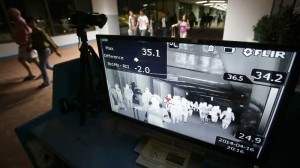
Passengers walk past a thermal scanner at the medical quarantine area at the arrival section of Manila’s International Airport in Paranaque, south of Manila, Philippines. AP FILE PHOTO
BACOLOD, Negros Occidental, Philippines — A nurse from Negros Occidental suspected of having the deadly Middle East Respiratory Syndrome-Corona Virus (MERS-CoV) has been quarantined in the intensive care unit of the King Fahd Medical City in Saudi Arabia, her husband said Sunday.
Her husband, who asked not to be identified, told the Philippine Daily Inquirer his 44-year-old wife has been working in the emergency room of the King Fahd Medical City.
He is calling for prayers for the recovery of his wife.
On Wednesday, when he spoke to his wife on the phone, she told him that she had pneumonia, and on Thursday, he was informed by her co-worker that she was quarantined in the ICU because she had MERS-CoV symptoms.
A bypass tube had been inserted into his wife because her lungs had a lot of phlegm, he was told.
Another nurse from the emergency room of the same hospital has also been quarantined, he said.
During the weekend, he was told that his wife appeared to be improving.
He said his wife has been working in Saudi Arabia since 2005 and would usually come home every year. They have a 13-year-old daughter.
In an earlier interview with Bombo Radyo, he said he had high hopes his wife would recover because another Filipina nurse there, who was said to have been hit by MERS-CoV, has recovered. The hospital where his wife is confined has high-technology equipment and she is being cared for by her co-workers, according to the husband.
The husband has also expressed his wish that his wife does not continue working in Saudi Arabia when she recovers.
Gov. Alfredo Marañon Jr. said on Monday he has instructed the Provincial Health Office to be vigilant to prevent the entry of MERS-CoV into Negros Occidental.
“We must be very careful as this is a deadly disease … the public should be vigilant, too,” he said.
Saudi health authorities announced Saturday two new deaths from the MERS-CoV, raising to 109 the number of fatalities since the disease appeared in the kingdom in September 2012.
MERS-CoV is considered a deadlier but less-transmissible cousin of the SARS virus that erupted in Asia in 2003 and infected 8,273 people, nine percent of whom died.
There are no vaccines or antiviral treatments for MERS-CoV, a disease with a mortality rate of more than 40 percent that experts are still struggling to understand.